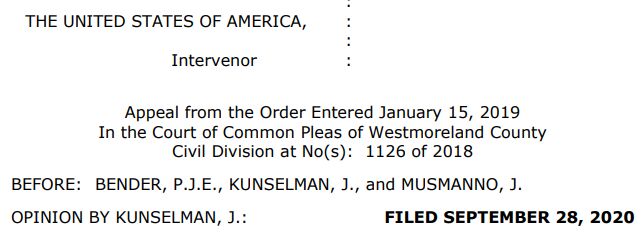In a shocking ruling issued Monday, September 28th, the Superior Court of Pennsylvania issued an opinion holding that the Protection of Lawful Commerce in Arms Act (PLCAA) of 2005 is unconstitutional under the 10th Amendment. This ruling comes from a lawsuit that emerged after the tragic death of 13-year-old J.R. Gustafson. It may have wide-reaching consequences, but it is not over yet.
Background of the Case
The background of the case is both simple and tragic. Two young teenagers, J.R. Gustafson and a 14-year-old friend (whose name is withheld) gained access to a Springfield XD-9 handgun while at the house of an unrelated adult, Mr. Hudec. The 14-year-old removed the magazine from the gun. Believing it unloaded, he pointed it at J.R. and pulled the trigger. The gun discharged, killing J.R. While J.R.’s friend eventually pled guilty to involuntary manslaughter, that was not the end of the case.
Mr. and Mrs. Gustafson, represented by an attorney from the Brady Campaign, sued both Springfield Armory and Saloom Department Store. Saloom is the gun store that Mr. Hudec purchased the firearm from. In the case, they are jointly “Gun-Industry Defendants”. Under the protections of the PLCAA, the Gun-Industry Defendants filed a motion to dismiss. The lower court agreed with their defense and dismissed the case. The Gustafsons appealed, and the Superior Court of Pennslyvania heard the case on appeal.
What Is the PLCAA?
The Protection of Lawful Commerce in Arms Act (PLCAA) of 2005 is a law that protects parts of the gun industry from lawsuits after their products were used in a crime. Both manufacturers and dealers benefit from this protection. This does not shield them from lawsuits alleging that a product is defective. The Gustafsons do allege that Springfield created a defective product, but that is not the focus of this ruling.
The PLCAA came about due to fears that various state and local governments would begin suing members of the gun industry in an attempt to bankrupt them through legal fees. After a bipartisan vote in both the House and Senate, President George W. Bush signed the act into law on October 26th, 2005.
What Is This Ruling?
The Gustafsons made two claims in their filing. First, and least important to the ruling, that the XD-9 is defective. Springfield created a gun that can fire without the magazine in it, and further, that Springfield did not provide an “adequate warning” that such could happen. That really is almost entirely unimportant to the ruling. The court gives it some small note but eventually instructs the lower court to deal with that issue. Second, and far more importantly, that the PLCAA was unconstitutional under the 10th Amendment. It does not cover a power granted to the Federal Government.
The US Government, and various other courts, have maintained for years that the PLCAA is in fact constitutional under the commerce clause. The commerce clause of the US Constitution gives Congress the power to regulate interstate commerce. It has become a broadly applied, and extremely powerful, tool for Congress to use for legislation.
The Pennslyvania Superior Court has held that the PLCAA is too broad of power under the commerce clause to be constitutional.
Selected Quotes from the Ruling:
the PLCAA encompasses local activities involving any “firearm, including any antique firearm, or ammunition, or a component part of a firearm or ammunition that has been shipped or transported in interstate or foreign commerce,” forever. This so-called “jurisdictional limitation” is essentially no limitation at all. Once PLCAA immunity attaches to a qualified product under Section 7903(4), that immunity lasts into perpetuity, even if the product has ceased its transportation, injures someone who never entered any commercial transaction, and never again returns to interstate commerce.
The court further argues that:
the filing of a state lawsuit, in state court, based on state tort law, “is in no sense an economic activity that might, through repetition elsewhere, substantially affect any sort of interstate commerce.” … It is interstate litigation.
Having decided that the PLCAA is not facially valid under the commerce clause, the court held that under the limitations imposed on Congress by the 10th Amendment, the PLCAA is unconstitutional.
In sum, the constitutional safeguards that override the PLCAA are the structural pillars of American government. These principles ensure that local matters remain under the local authority of the States, and they prevent the Federal Government from becoming all powerful.
So, what happens now?
It is entirely possible that this case will be appealed again. The defendants, Springfield Armory and Saloom Department Store, can request an en banc hearing. An en banc hearing would involve 9 judges re-hearing the case to issue a ruling. It is very likely they will do so. If they do, it is very likely the court will issue an injunction. What that means is that this court order would not be enforced until the en banc hearing results in a decision.
However, until that happens, Pennslyvania courts will be instructed to presume that the PLCAA is unconstitutional, and does not provide a reason to dismiss a case against a member of the gun industry.
 Your Privacy Choices
Your Privacy Choices
